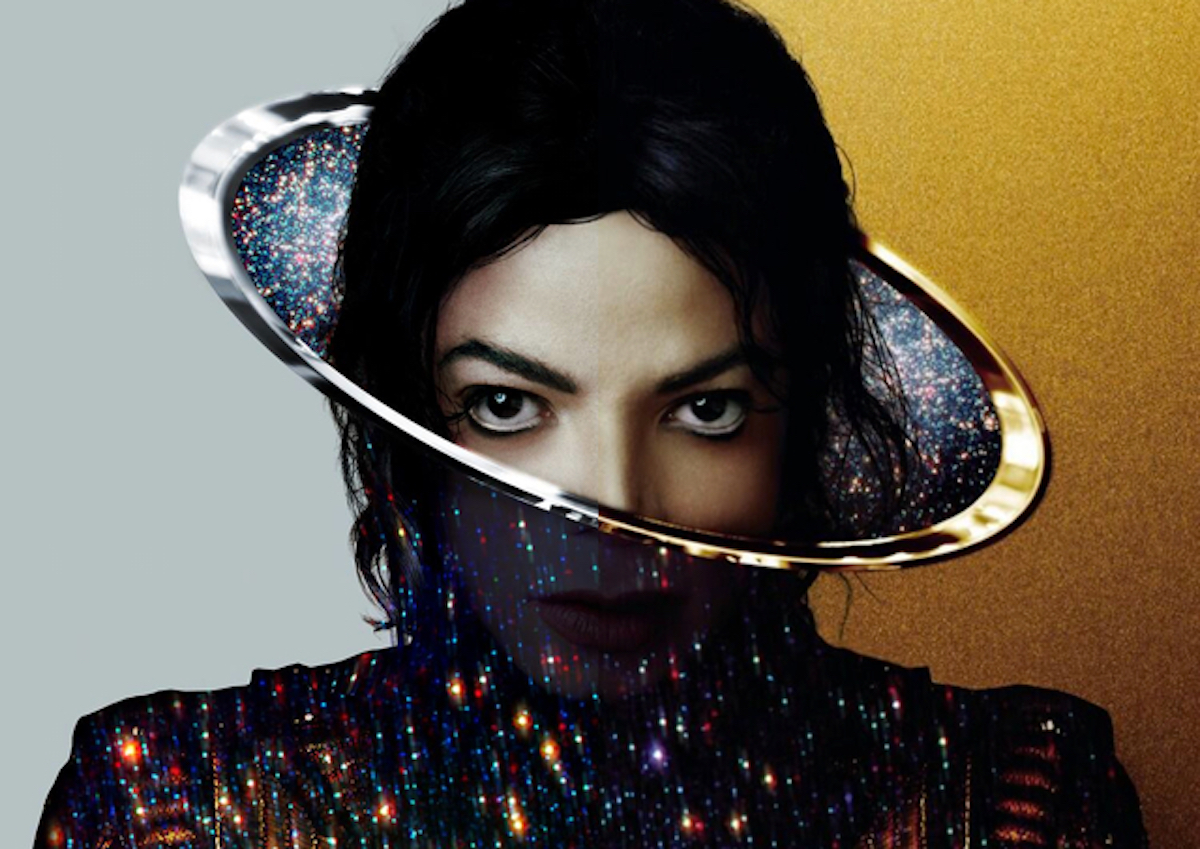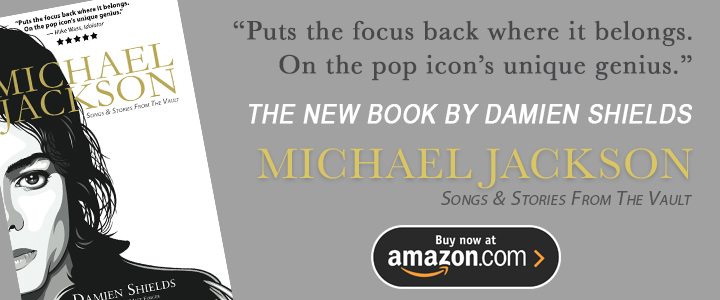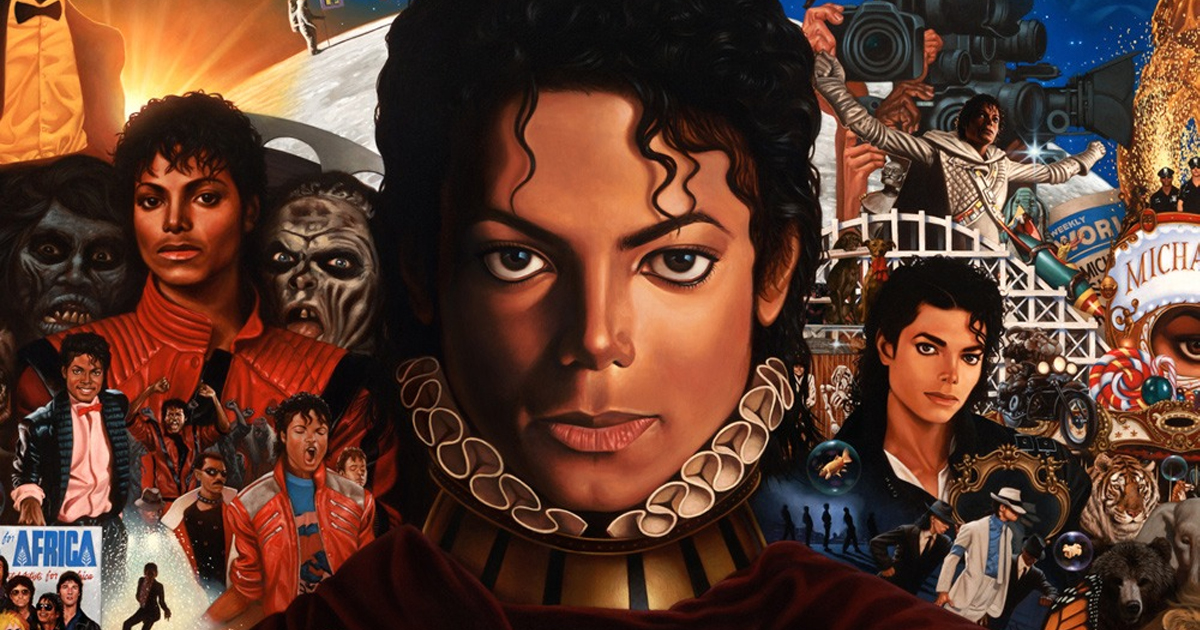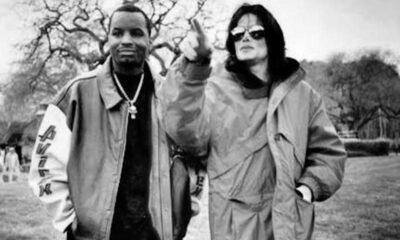Michael Jackson
Michael Jackson’s “Love Never Felt So Good” Available on iTunes NOW!
Published
10 years agoon

The first single, “Love Never Felt So Good”, from the upcoming Michael Jackson album, ‘XSCAPE’, has officially been released to iTunes and serviced to radio stations across the globe.
Two versions of the track, one a solo Jackson rendition and the other a duet featuring Justin Timberlake, have been released in a marketing campaign reminiscent of the way Mariah Carey, and other major artists during the ’90s and ’00s, launched singles.
The concept of issuing alternate versions of the same single is designed to maximise the track’s exposure by appealing to more than one demographic. The solo Jackson version of “Love Never Felt So Good”, co-produced by John McClain and Giorgio Tuinfort, will likely fare well on the Adult Urban charts, while the Timberlake duet, co-produced by Timbaland and J-Roc, will be a hit with younger audiences and could even make an impression on the Pop charts. Sales and airplay from both versions will be combined the song’s overall Singles Chart position will be determined.
Both versions of the track are very organic and borrow from the sonic approach Daft Punk and Pharrell took on their super-hit “Get Lucky”. Neither remix actually feels like a remix to me and, in my opinion, Justin’s vocals fit the Timbaland mix perfectly. You’ll also notice that Timbaland pays homage to Jackson’s 1979 hit “Working Day & Night” by sampling percussion and breaths from the track.
Check out “Love Never Felt So Good” by Michael Jackson, featuring Justin Timberlake, below:
And the solo Michael Jackson version:
Discuss below…
Damien Shields is the author of the book Michael Jackson: Songs & Stories From The Vault examining the King of Pop’s creative process, and the producer of the podcast The Genesis of Thriller which takes you inside the recording studio as Jackson and his team create the biggest selling album in music history.

Cascio Tracks
First Amendment Coalition to Support Sony and the Jackson Estate in Fake Songs Lawsuit
Published
3 years agoon
February 9, 2021
There has been yet another twist in the class action lawsuit filed by Californian consumer Vera Serova against Sony Music and the Estate of Michael Jackson regarding three allegedly fake songs commercially released on the 2010 Michael album.
In documents filed with the California Supreme Court yesterday, an organisation called The First Amendment Coalition has requested permission to file an amicus brief in support of Sony and the Estate’s purported constitutional right to sell fake songs as authentic Michael Jackson material.
FAC’s request comes after four separate amici were filed in support of plaintiff Serova by several consumer protection groups along with the California Attorney General’s Office.
All previously filed briefs support Serova’s assertion that this is a straightforward case of false advertising, and that billion-dollar corporations should not be able to commercially label fake art as authentic.
They also assert that by filing an anti-SLAPP motion against Serova, Sony and the Estate misappropriated a statute which is supposed to protect the general public against the limitless resources of wealthy corporations, and to prevent those corporations from intimidating the public into abandoning legal action against them.
Nine consumer protection organisations stated in a joint filing that Sony and the Estate have misused the anti-SLAPP statute to achieve the exact opposite of its intended purpose.
But according to documents filed yesterday, The First Amendment Coalition believes that if the Supreme Court rules in plaintiff Serova’s favour, and if a precedent is set that Sony and the Estate cannot sell fake songs as authentic Jackson material, it could have “significant implications for many different First Amendment contexts beyond the particular circumstances of this case.”
In this case, Sony asserts that they should not be held accountable for the statements made on the Michael album cover and in their television commercial, because those statements were “noncommercial” in nature. Rather, they argue, those statements are merely their contribution to the ongoing public debate about whether the vocals on three of the songs were authentic or fake, and that this makes it free speech under the First Amendment.
FAC has indicated that they will stand with Sony on this matter.
According to the mission statement published on their website, FAC is a nonprofit public interest organisation dedicated to “advancing free speech” and “public participation in civic affairs.”
By definition, public participation in civic affairs is a process in which members of society take collective action to address issues of public concern.
This begs the question: Is the definition of FAC’s mission more appropriately applied to a multi-billion dollar corporation’s purported right to claim that a commercial product is legit, when in fact it is fake? Or to a member of the public who seeks to take collective action to address the issue of that multi-billion dollar corporation falsely advertising that same product to millions of unwitting consumers?
Despite Sony and the Estate’s best efforts to stop her, the plaintiff in this case (Miss Serova) is a member of society who is attempting to take collective action (by filing a class action lawsuit) to address an issue of public concern (that a corporation may be defrauding consumers).
Moreover, FAC’s mission statement also claims to advocate for a “more open and accountable government” and “the people’s right to know”.
It should be noted that the Californian government is in fact advocating for openness and accountability and for the public’s right to know in this case – on behalf of the plaintiff, against the billion-dollar corporation that has conceded in its legal arguments to have ripped her off.
For the purposes of this proceeding, defendants Sony and the Estate have stipulated that the songs in question are indeed fake. And while their exact arguments aren’t due to be filed with the court until March 10, 2021, in the context of the defendants’ concessions, FAC could, in theory, be perceived to be advocating in favour of fraudulent representation of forged art, rather than for openness and accountability and the people’s right to know.
In a press release issued on January 29, 2021, the California Attorney General said:
“Products must deliver on their claims. If someone buys an album from a recording artist, they should expect that the songs on the album were made by that artist unless noted otherwise… We must hold companies accountable to stand by their products. Companies have a First Amendment right to communicate, but their claims must be informed and accurate.”
More to come when FAC files their amicus brief.
A podcast series called Faking Michael is in the works, detailing a decade-long investigation of this case. You can subscribe to Faking Michael on Apple Podcasts, Spotify and YouTube.
Damien Shields is the author of the book Michael Jackson: Songs & Stories From The Vault examining the King of Pop’s creative process, and the producer of the podcast The Genesis of Thriller which takes you inside the recording studio as Jackson and his team create the biggest selling album in music history.

Cascio Tracks
Californian Government Joins Fraud Lawsuit Against Sony Music and Jackson Estate
Published
3 years agoon
January 30, 2021
The California state government has officially joined a class action lawsuit against Michael Jackson’s estate and record company.
In a press release issued yesterday, the state’s Attorney General, Xavier Becerra, accuses Sony of “shirking responsibility” for making “false and misleading claims” about a posthumously released Michael Jackson album, and then declaring ignorance of their misrepresentation.
The Attorney General also filed an amicus brief with the California Supreme Court, urging them to intervene in the case of Serova vs Sony Music Entertainment, et al., for fear that “broad, destabilising consequences for well-established false advertising principles,” could be felt if it did not take action and rectify a problematic Appeals Court decision in the case.
The lawsuit at the centre of the amicus brief was filed almost 7 years ago. The suit alleges that Sony Music and the Jackson Estate misled consumers when they commercially released the Michael album, comprising 10 tracks, in December 2010.
The plaintiff in the case, Vera Serova, insists that three of the 10 tracks on Michael are part of an elaborate artistic fraud masterminded by co-defendants Eddie Cascio and James Porte, who sold the tracks to Jackson’s Estate for millions of dollars after the superstar’s death.
Serova alleges that those three tracks, known as the Cascio tracks, are fakes sung by an impostor. And she’s not alone.
Months before the album was released, members of the Jackson family warned Sony and the Estate regarding the Cascio tracks, insisting that they were fakes and should not be released. One of the Estate’s co-executors, John McClain, agreed with the Jackson family.
In response, Sony issued a press release stating that they had “complete confidence in the results of their extensive research” that the vocals were authentic. The company then released the album, including three Cascio tracks, against the family’s wishes.
Sony even went as far as to explicitly inscribe on the album cover that the vocals on all the album’s tracks were “performed by Michael Jackson.”
But despite Sony’s repeated assurances that the vocals were legit, when Jackson’s fans got their hands on the album and heard the Cascio tracks for themselves, a huge controversy ensued. Thousands upon thousands of fans around the world instantly rejected them as fakes.
Ironically, this very controversy – which Sony itself created by releasing the Cascio tracks – is one of the many points the company has since tried to raise as a get-out-of-jail-free card.
Sony says that because thousands of people were questioning the authenticity of the vocals, the company’s claim that Jackson sang them was not commercial in nature, but merely their non-commercial contribution to the ongoing authenticity debate.
But the Attorney General argues that Sony’s logic is absurd. The fact that there were questions over the vocals, the AG says, only increased Sony’s need be sure that the songs were indeed authentic if they intended on claiming they were:
“Questions about the authenticity of songs allegedly recorded by Michael Jackson shortly before his death naturally led to significant interest and debate among fans, members of the media, and the public more generally. That level of interest made it all the more important for Sony to provide accurate information about the songs to consumers.”
The AG added: “It would seriously frustrate the State’s interest in combating false or misleading advertising to immunise a seller from liability merely because its claims bear some relation to a matter of public interest or a public figure.”
Moreover, the Attorney General completely rejects Sony’s claims that their speech wasn’t commercial in nature.
Because the album cover explicitly stated that the songs were “performed by Michael Jackson,” Sony was bound to that statement as being the truth, and could be held liable under consumer protection laws if it were proven otherwise.
“A seller’s description of a product on a label or in an advertisement is a classic form of commercial speech. Thus, assuming Serova’s allegations are true, application of California’s false advertising statutes fully comports with the First Amendment.”
In the press release issued yesterday to alert the media of the California state government’s support of Serova’s lawsuit, Attorney General Becerra said:
“Products must deliver on their claims. If someone buys an album from a recording artist, they should expect that the songs on the album were made by that artist unless noted otherwise… We must hold companies accountable to stand by their products. Companies have a First Amendment right to communicate, but their claims must be informed and accurate.”
Sometime in mid-February the Los Angeles City Attorney’s Office is due to join the California Attorney General and the nine other consumer protection groups already supporting Serova’s case. No amicus brief has been filed in support of Sony or the Jackson Estate.
A date for the oral hearing of these briefs is yet to be set.
A podcast series called Faking Michael is in the works, detailing a decade-long investigation of this case. You can subscribe to Faking Michael on Apple Podcasts, Spotify and YouTube.
Damien Shields is the author of the book Michael Jackson: Songs & Stories From The Vault examining the King of Pop’s creative process, and the producer of the podcast The Genesis of Thriller which takes you inside the recording studio as Jackson and his team create the biggest selling album in music history.

Cascio Tracks
Fake Michael Jackson Songs Lawsuit Boosted by Support from Consumer Protection Groups
Published
3 years agoon
December 14, 2020
A legal quest for justice over a posthumous Michael Jackson album including 3 allegedly-fake songs has received a serendipitous boost on the 10th anniversary of the album’s release.
On Friday, December 11, 2020, the Berkeley Center for Consumer Law and Economic Justice filed an amicus curiae brief with the California Supreme Court in support of plaintiff Vera Serova’s ongoing class action consumer fraud lawsuit against Sony Music and the Estate of Michael Jackson.
The powerfully-worded brief was co-signed by 8 additional consumer protection organisations. Click here to read it in full.
Serova’s lawsuit, filed in 2014, alleges that Sony and the Estate misled her and millions of consumers when they commercially released the Michael album on December 14, 2010 – exactly ten years ago today.
The lawsuit alleges that three songs on the album are forgeries sung by an impostor vocalist, and that Sony and the Estate falsely advertised those songs to consumers as authentic Jackson material.
The three songs at the centre of the lawsuit – Breaking News, Monster and Keep Your Head Up – were originally co-written and produced by Eddie Cascio and James Porte, who are co-defendants in the fraud component of the case.
The consumer protection organisations wrote in their joint filing on Friday that Serova’s is a “straightforward case of deceptive advertising.”
Yet the case has been in legal limbo for more than four years.
Back in 2016, Sony and the Estate filed an anti-SLAPP motion against Serova, claiming that her lawsuit was a ‘strategic lawsuit against public participation’ (SLAPP) intended to deny the billion-dollar corporations their purported constitutional right to sell fake songs as authentic Jackson material.
For the purposes of their legal arguments, Sony and the Estate conceded that Jackson was not the singer of the three songs in question. To be clear, this was not an outright admission that Jackson was not singing – after 6 years in court, that issue hasn’t even been addressed yet.
Rather, their concession was made in order to prevent Serova from presenting evidence that the songs are fakes. Under normal circumstances, Serova would have been required to demonstrate that her case wasn’t a shakedown, and that she could substantiate her claims with supporting evidence.
But Sony and the Estate said that it didn’t matter if they were fake, arguing that the law allows them to lie to consumers regardless.
Their argument centres around their assertion that the statements made as part of the album’s promotional material – including on the album cover and in a TV commercial – are not commercial in nature. Yes, they’re arguing that the speech in a commercial isn’t commercial speech.
“If we ripped people off and it’s noncommercial speech, they lose under the statutes,” said Sony lawyer Zia Modabber in court. “That is just the law.”
In August 2018, the corporations succeeded in their bid to be dismissed from the case. Serova fought back, petitioning the California Supreme Court to intervene, which they did. But when the case was sent back to the Appeals Court in January 2020, Sony and the Estate were yet again dismissed.
Shockingly, the Appeals Court ruled that Sony and the Estate should be allowed to lie to consumers by selling fake songs as authentic Jackson material. And so Serova petitioned the California Supreme Court a second time, seeking a review of the Appeals Court’s bizarre ruling.
As reported here in April, the Supreme Court found that the Appeals Court’s ruling was legally problematic and granted Serova’s petition for review.
In their filing on Friday, the consumer protection organisations supporting Serova’s case took aim at Sony and the Estate’s application of the anti-SLAPP statute, writing that it “does not provide a get-out-of-jail-free card to forgers.”
Under the stipulation governing this proceeding, Sony’s promotion of Michael plainly violates California’s statutes protecting consumers from false and misleading advertising. Sony marketed Michael as “a brand new album from the greatest artist of all time,” with “9 previously unreleased vocal tracks performed by Michael Jackson.” Because, as the parties have agreed for purposes of this appeal, three of the nine songs were not sung by Michael Jackson, Sony has made advertising statements that were untrue and misleading and has therefore violated California’s basic consumer protection laws.
Amicus curiae brief, Berkeley Center for Consumer Law and Economic Justice et al., December 11, 2020.
The anti-SLAPP statute is intended to protect David from Goliath – to shield the general public against the limitless funds and resources of wealthy corporations, and to prevent those corporations from intimidating the public into abandoning legal action against them.
The consumer protection organisations state in their filing that Sony and the Estate have misused the anti-SLAPP statute to achieve the exact opposite of its intended purpose:
What the present proceeding entails is the misuse of the anti-SLAPP statute by a well-funded corporation to try to silence individual consumer claims arising from what are conceded to be, for purposes of this appeal, the corporation’s misleading commercial statements. In other words, this action embodies precisely the reverse of what the anti-SLAPP statute is intended to accomplish.
The consumer protection organisations concluded their 47-page filing with the following:
The anti-SLAPP statute must not be misused to undermine California’s consumer protection laws. When Sony promoted Michael, it engaged in misleading or deceptive advertising. Sony has no free speech right to deceive consumers. Ms. Serova’s claim for misleading advertising is not a “strategic lawsuit against public participation.” To the contrary: it is a straightforward deceptive advertising action brought to vindicate precisely the individual rights that both California’s consumer protection laws and its anti-SLAPP statute are designed to protect.
The California Attorney General’s Office has also stepped in, requesting an extension to file their own amicus brief in support of Serova.
This means that when the California Supreme Court hears Serova’s case sometime next year, she will not only have the support of at least 9 independent consumer protection organisations, but also the backing of the California state government.
UPDATE: The Los Angeles City Attorney’s office has also joined the chorus of support behind Serova’s case, formally requesting an extension to file an amicus brief on December 14, 2020.
Stay tuned for further updates on the case. This website will continue to provide information as it becomes available.
You can also subscribe to the upcoming Faking Michael podcast series about this matter. A release date has not yet been set, but subscribers will have episodes delivered to them when they do become available.
The trailer for Faking Michael is available on Apple Podcasts, Spotify and YouTube.
Damien Shields is the author of the book Michael Jackson: Songs & Stories From The Vault examining the King of Pop’s creative process, and the producer of the podcast The Genesis of Thriller which takes you inside the recording studio as Jackson and his team create the biggest selling album in music history.

Subscribe to Podcast
Articles


Producer Teddy Riley Comes Clean Regarding Fake Songs From Posthumous Michael Jackson Album
Legendary producer Teddy Riley has spoken out against the controversial Michael Jackson album he worked on after the pop star’s...


Huge Win for Michael Jackson Fan as Supreme Court Rejects Sony’s Free Speech Defense in “Fake” Songs Lawsuit
Two ‘get out of jail free’ cards, used by lawyers for Sony to avoid facing the music in a consumer...


Alleged Forgeries Removed From Michael Jackson’s Online Catalog After 12 Years of Protests and a Fraud Lawsuit
Three songs alleged to have been falsely attributed to Michael Jackson were abandoned by the pop star’s estate and record...

Supreme Court Judge Grills Sony Lawyer Over ‘Contradictory’ Arguments in Alleged Michael Jackson Fraud
A lawyer defending Sony Music and the Estate of Michael Jackson in a consumer fraud lawsuit has today argued that...

Court Date Set in Supreme Court Battle Over Legal Right to Sell Alleged Michael Jackson Forgeries
Sony Music and the Estate of Michael Jackson will again fight for their right to sell alleged forgeries as authentic...


Invincible, ‘Xscape’ and Michael Jackson’s Quest for Greatness
Below is a chapter from my book Michael Jackson: Songs & Stories From The Vault, revised for this article. The full book...


‘Blue Gangsta’ and Michael Jackson’s Fascination with America’s 20th Century Underbelly
Below is a chapter from my book Michael Jackson: Songs & Stories From The Vault, revised for this article. The full book...


Michael Jackson Meets America in Invincible Album Outtake ‘A Place With No Name’
Below is a chapter from my book Michael Jackson: Songs & Stories From The Vault, revised for this article. The full book...

First Amendment Coalition to Support Sony and the Jackson Estate in Fake Songs Lawsuit
There has been yet another twist in the class action lawsuit filed by Californian consumer Vera Serova against Sony Music...

Californian Government Joins Fraud Lawsuit Against Sony Music and Jackson Estate
The California state government has officially joined a class action lawsuit against Michael Jackson’s estate and record company. In a...



Nick
May 2, 2014 at 5:24 am
Both versions sound Great!!!!
JVL
May 2, 2014 at 5:35 am
I was never crazy about the “Love Never Felt So Good” demo. The new solo version sounds nice, but just nice. The Timbaland version rocks my socks, but I lost excited to hear the second verse replaced with Justin’s vocals. They could have let Justib do everything else he did on the track… his background harmonies on the chorus sound so wonder… and I like the talking parts he do. Most importantly, it’s the music of the Timbaland version that I like. If only that was the music that went on the solo version. Anyway… this song was the one that would challenge me most, but I do like it much more than the demo with just piano.
the_presator
May 2, 2014 at 8:04 am
The solo version is really nice 🙂
Erik
May 2, 2014 at 9:32 am
Did you forget to include the link? Not showing up via iTunes search.
TheresaB
May 2, 2014 at 10:56 am
I thought I heard the percussion and breaths from “Working Day And Night.” Thanks for confirming what I thought I heard. I love them both…real toe tappers. I bought the solo version on iTunes and thought I would wait for the album with the version featuring JT. Thanks for explaining that they combine the sales of both to determine chart position. That ‘s interesting and I am glad it works that way.
Tom
May 2, 2014 at 11:05 am
The solo McClain version is sloppy. I’m hearing quite a few sync issues between the added music and the original demo. The drumming in the second verse is totally off with the demo, and the handclaps in the following chorus actually go HUGELY off beat. Can’t believe this got released this way. Sonically, the whole thing sounds uninspired too, the drums sound like they’re sampled off an old record, which is fine for hiphop, but not for the smooth disco-revival sound this mix tries to emulate. I also can’t believe they used a song for which the only source is a noisy stereo track and then not cleaned it up. The fact that they didn’t get rid of some of the high frequency sibilant noise distorting the vocal is odd, considering the Timbaland version actually did this fairly well. This sounds like a polished noisy demo.
The JT version is better in all these regards. It feels more like an actual full-fleshed song, and not a demo that was overdubbed, which has a lot to do with how they processed the vocal, even if it’s a little thin (which is not solved by the slight boost in the lower frequencies). The production is a bit too subtle, but sonically it really improves on the McClain version. I wish we had a sort of hybrid between these two versions because that would’ve been the one to use.
Doc
May 2, 2014 at 12:06 pm
Tom, make a hybrid! 🙂 I did, it’s fun and they overlap fairly well, except for the JT version being slightly faster and having the added part in the middle with the Working Day And Night breaths.
gg
May 2, 2014 at 11:15 am
very good !
Doc
May 2, 2014 at 12:04 pm
Bad things:
I’d hoped they had a cleaner recording of the vocals than the one from the leaked demo, but apparently the didn’t. When you listen to the tracks in proper studio headphones the vocals sound as if you’re listening to them through a set of bad computer speakers. And the handclaps in the second chorus are weirdly off-beat, as Tom said. Once you notice them, they become extremely hard to ignore when listening again.
And all in all, it is sort of weird to take a mellow type of love song and go all “let me see you move”on it. Justin Timberlake seems slightly comical with all his “dance, come on” on this.
Good things:
All in all I think they both are okay tracks.
I really like the melody and Michael’s singing style (as I did when listening to the demo), even though it does sound very early eighties and, in my opinion, might not be the perfect song to try to contemporize. But I agree that they didn’t overproduce it, they kept it fairly simple and didn’t drown the vocals. I recommend listening to the song in a medium to low quality set of headphones or speakers, as that makes the demo-sound of the vocals less obvious. I also had a lot of fun putting the two versions on top of each other in a sound editing program – which, apart from being great, geeky fun for a few hours made me like both versions quite a lot, flaws and all, after listening to them a million times. 🙂
Alex Stassi
May 2, 2014 at 12:23 pm
Agree with Tom about the second verse and the syncing… can’t believe they released it that way…great shame, but the JT remix is superb!!!
Sattapaal
May 2, 2014 at 3:53 pm
do you think they purposely made the solo one flawed so that they can push the JT version.
i dont know. i still like the solo version.
JVL
May 2, 2014 at 10:30 pm
I felt that way as well a bit upon hearing both. I just think Timbaland did such a more wonderful job. They should just let the mix and music he did be for the remix AND solo version. Goodness I wish there was a way to throw that idea towards the estate.
Sattapaal
May 2, 2014 at 3:55 pm
maybe theyve done it on purpose so that the songs cant be web ripped and sold on. let me know if anyone has heard them on itunes to see if the production and quality of the songs are significantly better.
Doc
May 4, 2014 at 7:57 am
I got them through itunes, it’s the same.
I think they just figured (and probably rightly so) that most people won’t notice the noisy vocal track, because you won’t if you play it in mp3 quality from your phone or ipod with the standard earphones.
The super annoying thing is that the discrepancy between the music and the vocal track will be even more audible on the cd. Usually the only reason I would buy the cd would be because the quality difference between mp3 and lossless music formats is very obvious when it comes to Michael’s voice, because it’s so high, so I just hope the quality vocal tracks on the rest of the material are better.
the_presator
May 2, 2014 at 4:59 pm
Or maybe they did it to avoid changing MJ’s voice? Surely they don’t want the whole “imposter” thing to happen again.
Damien Shields
May 2, 2014 at 5:11 pm
The “impostor” thing only happens when an impostor is involved.
the_presator
May 2, 2014 at 5:33 pm
A lot of people think that such an imposter was involved in the Michael album. And to my surprise some think that it’s not Michael singing in LNFSG. There are a few disturbing comments under the two videos in YT.
Clearly these people are uninformed, but if I were to listen to a new MJ song, without knowing anything about it, my first thought wouldn’t be that it’s fake. This just shows how much negative impact had the situation with the previous album on the fans.
Damien Shields
May 2, 2014 at 5:40 pm
An impostor was most definitely used on the ‘Michael’ album.
JVL
May 2, 2014 at 10:33 pm
Yes, and sadly, for fans to refer to anything new that comes out, that is MJ singing, calling it fake, it discredits the initial real claims on the MICHAEL album. Then you have those who don’t care either wY because they are 100% against any kind of posthumous releases and call fans who love it “not real fans.” #JustAMess
Pas Mater
May 4, 2014 at 12:17 am
When you see the name “Cascio” on it – then you know it’s fake. Those songs are Breaking News, Monster & Keep Your Head Up. All other released songs are real MJ songs.
Michael
May 2, 2014 at 5:47 pm
I like both versions but the JT version is better throughout. In the McClaine version, the out of time hand claps 1/2 way through (starting around 2 minutes), would have driven MJ crazy !!
Arya
May 2, 2014 at 6:34 pm
I personally think this was a great choice as a single especially for radio airplay. A peppy song is always warmly received and this indeed is an upbeat dance number. A lot of people have commented that they were reminded of the OTW era which is great! Also shows that this song is going to be a hit! I am happy with the new versions and can’t wait to hear the rest of the tracks!
JVL
May 2, 2014 at 10:37 pm
I believe they are trying to release the least best track, to show how strong the album is, by showing thT the weakest track is so good compared… kind of like how it was done with Thriller and “The Girl Is Mine”.
It blows my mind to know that if at least 3 singles are released, that one of them could truly be “Blue Gangsta”, “Xscape”, or “Slave To the Rhythm”.
Ray Harmon
May 2, 2014 at 9:08 pm
The “Working Day and Night” grabs are kind of disappointing. Seems insulting to the listener, but maybe I’m still over-sensitive. Justin’s vocal is also way stronger and he’s the one doing call-outs, which really imbalances the duet version. They couldn’t find audio of MJ saying the word “dance?” Because I’m pretty sure he said it a billion times. I definitely agree with others that the mixing feels sloppy and the decision to go with a song whose lyrics WERE actually finished later and released by another legendary singer just adds to that feeling. There are at least five lyrically complete songs that could’ve made for strong candidates. Womp womp…
Billboard says they started from 24 tracks and worked down to 8. Here’s hoping none of those are repeats from prior releases like The Ultimate Collection or scratch vocals where he was just trying to get the melody down on tape like “LNFSG.”
Ray Harmon
May 2, 2014 at 9:12 pm
Btw, the first few seconds of this videoclip have more of the chorus from the new version of “Xscape” and I think I may actually love it. So that’s hopeful.
JVL
May 2, 2014 at 10:40 pm
Man, I BET “Serious Effect” was one. Lawd, that’s the only song missing from XSCAPE. Well, that and “What More Can I Give”.
Diana Rose
May 3, 2014 at 11:40 am
they could have taken “let’s dance” from space dance even
Diana Rose
May 3, 2014 at 11:48 am
someone needs to do a mash up of lnfsg and butterflies. that music would mesh awesome with this track.
Jim Smith
May 3, 2014 at 12:46 pm
5 seconds of the song XSCAPE can be heard at the beginning of this interview:
http://www.youtube.com/watch?v=eDWiTqPOlRM
Sounds great! 😀
I played these 5 seconds in a loop a million times 😀
Judith Mason
May 3, 2014 at 6:49 pm
Why has the Solo version of this song been removed by VEVO?
Mystery Man
May 3, 2014 at 10:31 pm
Maybe because the single is out, anyway it’s strange.
I found the song “Slave to the rhythm” with Justin Bieber, I just can’t understand why it won’t be on the album… it’s related to those two songs with the same title that will be on the album… mystery…
Pas Mater
May 4, 2014 at 12:21 am
That Justin Bieber version was not authorized by MJ Estate meaning it is not official – it is a bootleg. But it is the same song. What are they releasing now is MJ solo version (as he left it, unfinished) and new finished version produced by Timbaland.
the_presator
May 4, 2014 at 9:38 am
@Judith Mason
It’s now reuploaded.
Cass
May 4, 2014 at 7:27 pm
I haven’t seen anyone mention this but maybe politics are involved?
This single is tied to the same people who worked on This Is It (or I Never Heard)..This could be a case of the creators pulling hard to get money from Sony and the estate or Sony kissing up to certain people. I think I read Paul Anka had an issue with Sony using This Is It without permission
or something.
Out of all the known material out there they pick these? LA Reid even said he only went for songs with finished lyrics.
Seems sketchy.
Tricia
May 5, 2014 at 12:29 am
I always find interesting how some serious music detailed ppl dissect the songs. I bet you 99% of the general public out there (including me) wouldn’t hear absolutely ANYTHING wrong with these two tracks. They are both amazing in their own right. And to expand, I am soooo glad I am not a music techie.
John John
May 8, 2014 at 10:16 am
Xscape will be released tomorrow May 9th in some countries like Austria, Germany, Switzerland.
So it will be possible to hear a sample of all the songs in iTunes Store starting tomorrow 😀
I’m excited!